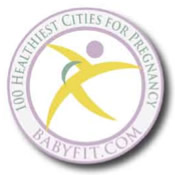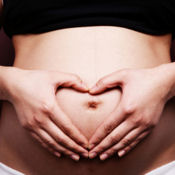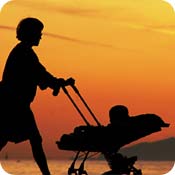
Care for yourself by:
- Keeping yourself as comfortable as possible.
- Preventing dehydration by drinking 8 to 12 cups of liquids.
- Not eating or drinking for a few hours or until your stomach has settled.
- Avoiding dairy products, fatty and greasy foods, fried foods, and highly-seasoned food for a few days.
- Avoiding caffeine until you have returned to normal.
When choosing foods and liquids: Try ice chips or small sips of "Stage 1" (see chart below) liquids for no more than 24 hours. Then, slowly add "Stage 2" foods, such as low-fiber carbohydrate sources and low-fat protein foods as tolerated. If the vomiting returns, go back to "Stage1" beverages and foods until you are able to advance.
Seek medical attention if:
- You are unable to drink anything for 24 hours
- Vomiting persists beyond two or three days
- If you become dehydrated (experiencing excessive thirst, dry mouth, little or no urination, severe weakness, dizziness or light-headedness).
- You vomit blood.
- You have a chronic medical condition, especially one that is affected by changes in your food intake (such as diabetes).
If your symptoms include diarrhea (loose or watery stools) and abdominal cramping, you may have a viral infection, which typically clears on its own without antibiotics. Nausea and vomiting may precede diarrhea along with other flu-like symptoms such as a low-grade fever, achy or cramping muscles and headache. Diarrhea can also be caused by bacteria or parasites, medications, artificial sweeteners like sorbitol and mannitol, and other underlying medical problems.
Care for yourself by:
- Choosing whether or not to use over-the-counter medications such as Imodium or Kaopectate. These may slow the diarrhea, but they will not speed your recovery.
- Preventing dehydration by drinking 8 to 12 cups of clear liquids daily.
- Avoiding dairy products, fatty and greasy foods, fried foods, and highly-seasoned food for a few days.
- Avoiding caffeine until you have returned to normal.
When choosing foods and liquids: Begin with "Stage 1" (see chart below) liquids. Then, slowly add "Stage 2" foods, such as low-fiber carbohydrate sources and low-fat protein foods as tolerated and as your bowel movements return to normal.
Seek medical attention if:
- Diarrhea persists beyond one week
- You become dehydrated (experiencing excessive thirst, dry mouth, little or no urination, severe weakness, dizziness or light-headedness).
- You have severe abdominal or rectal pain, bloody stools, a temperature greater than 101 degrees Fahrenheit, or signs of dehydration despite drinking fluids.
- You have a chronic medical condition, especially one that is affected by changes in your food intake (such as diabetes).
Suggested Food Intake for Sick Days
Continued ›
|







Member Comments